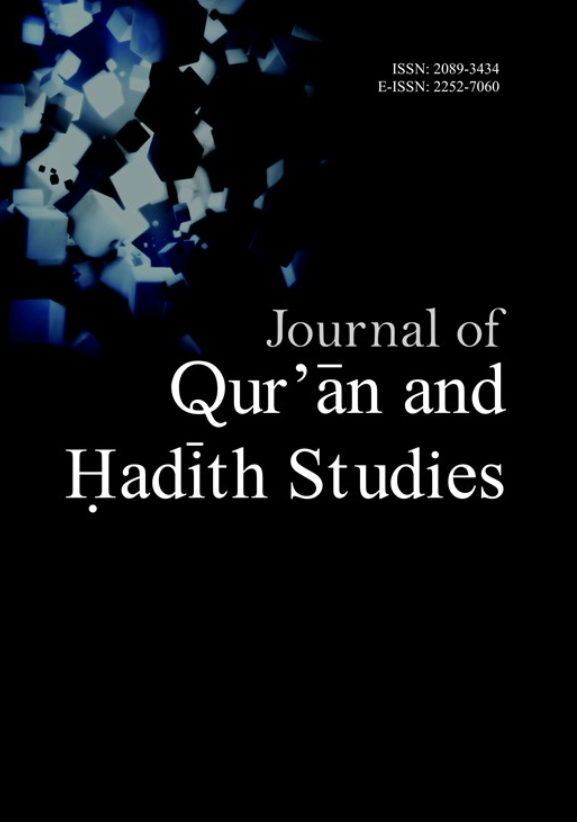Al-Wala’ wal Bara’: Loyalty, Identity, and the Prophet’s Message through the Lens of Hadith Criticism
DOI:
https://doi.org/10.15408/quhas.v14i2.46550Keywords:
al-Walā' wa al-Barā', Prophetic Hadith, Sunan Abi Daud, Tahlili MethodAbstract
This research analyzes the hadith narrated by Imam Abu Daud, number 4681, concerning the concept of al-Wala' wal-Bara', a crucial pillar in understanding Muslim social relations and creed, as it is often misinterpreted leading to exclusive or even extremist attitudes towards non-Muslims. Employing a descriptive qualitative method and library research, the analysis involves an external approach (hadith takhrij, jarh wa ta'dil, i'tibar sanad, and matan criticism) and an internal approach (textual understanding from hadith commentaries and contextual understanding based on contemporary thought, especially Sheikh Yusuf al-Qaradawi's approach). The findings indicate that the hadith is graded hasan in both its chain of narration (sanad) and text (matan). Substantively, it teaches that love and hate for the sake of Allah signify perfect faith. This study concludes that al-Wala' wal-Bara' must be understood in a balanced way to avoid misuse to justify intolerance. The research also highlights the clear distinction between loyalty (al-wala'), a matter of creed, and tolerance, a social principle. Loyalty to Allah and His religion does not negate fair and good treatment of non-Muslims, provided they are not hostile to Islam. The implication is the importance of a moderate approach in understanding hadiths related to interfaith relations so that Islamic values of rahmatan lil 'alamin (mercy to all worlds) can be realized in social practice.
References
’Abd al-Qawi, S. bin. (1419). At-Ta’yin fi Syarh al-Arba’in. Beirut: Mu’assasat ar-Rayan.
Abdul Wahab, M. (2005). Ushul Tsalatsah.
Afriani, A., & Wijaya, F. (2021). Pendekatan Tekstual Dan Kontekstual Dalam Study Hadist. Alifbata : Jurnal Pendidikan Dasar, 1(1), 37–54. doi: 10.51700/alifbata.v1i1.91
Ahmad, K. (1427). Badzl al-Majhud fi Hall Sunan Abi Dawud. India: Markaz asy-Syaikh Abi al-Hasan an-Nadwi lil-Buhuts.
al-‘Asqalānī, I. Ḥajar. (1415). Al-Iṣābah fī Tamyīz aṣ-Ṣaḥābah. Beirut: Dār al-Kutub al-‘Ilmiyyah.
al-Bukhari, M. bin I. (1422). Shahih Bukhari. Mesir: Dar Ibnu Jauzi.
al-Qahiri, A.-M. (1356). Fayd al-Qadir Syarh al-Jami’ as-Saghir. Mesir: al-Maktabah at-Tijariyyah al-Kubra.
Al-Hasan. (1424). Jami’ al-’Ulum wa al-Hikam. Dar as-Salam li at-Thiba’ah wa an-Nasyr wa at-Tawzi’.
Al-Majid, S. ’Abd. (2009). Al-Madkhol. Dimasyqi: Dar Ibn Katsir.
al-Mizzī. (1400). Tahdhīb al-Kamāl fī Asmā’ ar-Rijāl. Beirut: Mu’assasat ar-Risālah.
Al-Qahthani, M. bin S. (2019). Al-Wala’Wal Bara’: Loyalitas dan Antiloyalitas Dalam Islam. Era Adicitra Intermedia.
Al-Qordhowi, Dr. Y. (2000). Kaifa Nata’amal ma’a al-Sunnah al-Nabawiyah. Dar al-Syuruq.
Al-Rifa’i, S. bin H. (2019). ’Inayah al-’Ulama bil Isnad wa ’Ilm al-Jarh wa al-Ta’dil. Madinah: Mujma’ al-Malik Fahad.
Al-’Ubaidi, Dr. R. M. ’Abd. (2018). Al-Hadis al-Tahlili Dirasah Ta’shiliyah. Baghdad: Maktab Shams al-Andalus.
Amrulloh, A. (2022). Metode Studi Hadis Taḥlīlī Dan Implementasinya. Nabawi: Journal of Hadith Studies, 2(2).
Annisa, V. (2020). Konsep Al-Wala’ Wa Al-Bara’ Perspektif Sayyid Quthb.
as-Sindi, A. al-Hasan. (1431). Fath al-Wadud fi Syarh Sunan Abi Dawud. Madinah al-Munawwarah: Maktabah Adhwa’ al-Manar.
Asfiyak, K. (2019). Jarh Wa Ta’dil: Sebuah Pemodelan Teori Kritik Periwayatan Hadis Nabawi. Jurnal Ilmiah Ahwal Syakhshiyyah (JAS), 1(1), 9.
Asrori, S. (2019). Mengikuti Panggilan Jihad; Argumentasi Radikalisme Dan Ekstremisme Di Indonesia. Aqlam: Journal of Islam and Plurality, 4(1). doi: 10.30984/ajip.v4i1.911
Darmalaksana, W. (2020). Metode Penelitian Kualitatif Studi Pustaka dan Studi Lapangan. Pre-Print Digital Library UIN Sunan Gunung Djati Bandung. Diambil dari http://digilib.uinsgd.ac.id/id/eprint/32855
Ibn al-Atsīr, ‘Izz ad-Dīn. (1415). Usd al-Ghābah fī Ma‘rifat aṣ-Ṣaḥābah. Dār al-Kutub al-‘Ilmiyyah.
Ilmiah, T. P. P. P. K. (2012). Pedoman Penulisan Karya Ilmiah. Bandung: UPI.
Istianah, D., Laily, A. N. A., Ramadhan, M. N., Fadillah, M. H., & Fadhil, A. (2024). Pengaruh pemikiran toleransi Habib Jafar Al-Hadar dalam membangun keharmonisan antarumat beragama di Indonesia. Jurnal Ilmu Pendidikan dan Sosial, 3(4), 253–263. https://doi.org/10.58540/jipsi.v3i4.673
Izzuddin, M. (1433). Syarah Masabih as-Sunnah. Idarah ats-Tsaqafah al-Islamiyah.
JpnMuslim. (2015). TAFSIR FI ZILALIL Qur’an Sayyid Quthb Arabic pdf. Retrieved from http://archive.org/details/TAFSIRFIZILALILQuranSayyidQuthbArabic
Mahmud, A.-H. (1433). Al-Mafatih fi Syarh al-Masabih. Dar al-Nawadir.
Nafisah, S. (2017). Tafsir Al-Walāwa Al-Barādalam Surat Al Mumtaḥanah (Sikap Muslim Terhadap Negara Kebangsaan).
Nz, A. (2019). “Shifting Paradigm” Pemahaman Hadis Di Indonesia (Studi Interpretasi Kontekstual Ali Mustafa Ya’qub terhadap Hadis-Hadis Hubungan dengan Non-Muslim). Jurnal Ilmu Agama: Mengkaji Doktrin, Pemikiran, Dan Fenomena Agama, 20(2). doi: 10.19109/jia.v20i2.5077
Taimiyyah, I. (1980). Majmu’ al Fatawa. Beirut: Darul Fikr.
Zaduqisti, E., Zuhri, A., & Mashuri, A. (2019). Rekonsiliasi Dan Toleransi Muslim‑Non Muslim Dalam Bingkai Moderasi Islam.
ʿUbayd Allah, A. al-Hasan. (1404). Mirʿat al-Mafatih Sharh Mishkat al-Masabih. Banaras al-Hind: al-Jami’ah al-Salafiyyah.
Downloads
Published
Issue
Section
License
Copyright (c) 2025 Halimatus Sa'diyah, Amrulloh Amrulloh

This work is licensed under a Creative Commons Attribution-ShareAlike 4.0 International License.






